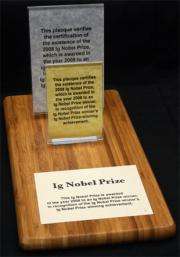Ig Nobel Prizes: Why onions make you cry and Enya is bad in the operating room

Let's face it: The Nobel Prizes aren't for everyone. That's why we celebrate the Ig Nobel Prizes, which were handed out Thursday night at Harvard's Sanders Theater.
Among this year's winners were scientists who discovered that alcohol makes people think they're attractive and that the longer a cow has been lying down, the more likely she is to stand up.
These awards are handed out by the folks who publish the Annals of Improbable Research. Though the discoveries they recognize can seem obvious, inconsequential or just plain goofy, the awards do have a purpose: To "honor achievements that first make people laugh, and then make them think."
Here are the achievements that earned the 2013 Ig Nobels:
The Medicine Prize was awarded to a group of Japanese researchers who determined that mice who got heart transplants survived longer if opera music or Mozart was playing in the background during their surgeries, compared with mice who went under the knife to Enya or to a single-frequency tone. The beneficial music seemed to stimulate production of helpful immune system cells. Their results were published in the Journal of Cardiothoracic Surgery.
The Psychology Prize went to European researchers who figured out that beer goggles can be trained on oneself. This team conducted two experiments that found that the more alcohol a person consumed, the more highly they rated themselves for attractiveness, intelligence and cleverness. Their study appeared in the British Journal of Psychology.
The unusual Joint Prize in Biology and Astronomy recognized vision scientists who tested the ability of dung beetles to roll their balls of manure under clear and cloudy nighttime skies. Their findings, published in the journal Current Biology, demonstrated that the insects use the Milky Way to navigate.
The Physics Prize was handed out to a European team that wondered whether it would be possible for people to walk on water - actually, to run across the surface of a hypothetical pond - under the low-gravity conditions that exist on the moon. Their calculations revealed that the answer is yes. You can read the report from PLOS One.
The Chemistry Prize investigated the age-old mystery of why onions make people cry. The winning team, from Japan, showed that the plant biochemistry at work involved a previously undiscovered enzyme called lachrymatory-factor synthase. If onions could be engineered without that enzyme, it may be possible for them to retain their flavor and nutritional value without causing eyes to water, they wrote in the journal Nature.
The Archaeology Prize went to two adventurous researchers who took a cue from Jonas Salk and turned themselves into experimental guinea pigs. In order to figure out how bones are damaged when digested by mammalian carnivores, one of the researchers - they don't say which - swallowed shrew that had been skinned and eviscerated. The resulting bone remains were thoroughly scrutinized and described in the Journal of Archaeological Science.
The Public Health Prize recognized researchers in Thailand who responded to an epidemic of penile amputations in the early 1980s by improving the surgical method for reattaching these penises. The amputations "were usually performed by angry wives on philandering husbands," they explained in a study they published in the American Journal of Surgery.
On the mathematics front, the Probability Prize went to researchers at the Scottish Agricultural College in Edinburgh who wanted to get a better understanding of what made cows decide when to lie down and when to stand up. The question isn't entirely trivial: A cow's posture can indicate whether she is in heat or if she has a health problem. After observing nearly 11,000 "lying episodes," they determined that the longer a cow has been lying down, the sooner she will stand up. However, they were surprised to discover that the reverse was not true. Their report was published in Applied Animal Behaviour Science.
The Safety Engineering Prize went to the late American inventor Gustano Pizzo, who was way ahead of his time. In 1972, he filed a patent for what he described as an "anti hijacking system for aircraft" that would trap would-be hijackers, seal them in the belly of the plane, then drop them through bomb bay doors to parachute to the ground, where they'd be met by law enforcement authorities. He received U.S. Patent 3811643 in 1974.
And just like the Nobel Prizes, the Ig Nobels aren't all about science and medicine. They have a Peace Prize too, and it went to Belarus President Alexander Lukashenko for banning applause in public. The award was shared with the Belarus State Police, "for arresting a one-armed man for applauding," according to the Ig Nobel citation.
Journal information: PLoS ONE , Nature , Current Biology , Journal of Archaeological Science , Applied Animal Behaviour Science
©2013 Los Angeles Times
Distributed by MCT Information Services
















